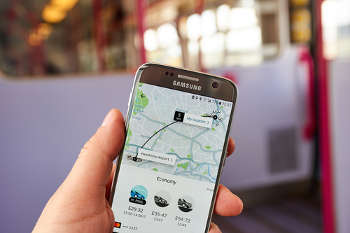The Transport Select Committee is launching a new inquiry to find out whether bold claims about the transformative power of Mobility as a Service (MaaS) are justified.
The committee has pointed out that the most popular MaaS apps to date tend to be single mode, despite door-to-door journeys in cities tending to utilise several transport modes, but that in an emerging model of MaaS, multiple modes of transport are brought together under a single app.

Current mobility apps tend to be single mode
Proponents of the emerging MaaS model believe it has the potential to make getting around via public and shared transport so convenient that it will negate the need for people in and around cities to own their own car, the committee said.
Committee chair Lilian Greenwood said: ‘Integrating urban transport modes into a single, integrated MaaS app represents a really exciting opportunity to transform how we get around in our cities.
‘An integrated MaaS app can create a single, seamless journey, cutting out the hassle of separate ticketing for different legs of a journey. The app can plan and book your whole journey from door-to-door in the most efficient way possible, using real-time service data across all the transport modes in the city. This could substantially reduce reliance on the private car; ease congestion; increase productivity; and lead to more pleasant, healthier cities with better air quality.
‘Integrated MaaS is a much talked about concept, but it is not generally well understood. We want to increase public understanding; find out if the bold claims are justified; and, if they are, recommend ways the Department for Transport and others can support and facilitate its implementation in the UK.'
The committee has called for written evidence by Friday 22 December addressing one or more of the following terms of reference:
- Global evidence to date on the effectiveness of integrated, multi-mode MaaS apps in relation to boosting the efficiency of urban public transport systems; and managing demand for road use in cities; reducing road congestion; and improving air quality.
- Overcoming the barriers to implementation of integrated, multi-mode MaaS apps in UK cities, including - current powers, capabilities and resources of local and regional transport authorities; current commissioning models, including the rail franchising system; and transport providers' unwillingness to share data, customers and revenue (including car hire companies; innovators in autonomous vehicles; rail, metro, and bus operators; cycle hire schemes; car clubs; and others)
- The role of central government, particularly the Department for Transport, in raising awareness, building the evidence base, and harnessing the potential of MaaS; and overcoming concerns about digital exclusion, ensuring mobility remains accessible to all.
Register now for full access
Register just once to get unrestricted, real-time coverage of the issues and challenges facing UK transport and highways engineers.
Full website content includes the latest news, exclusive commentary from leading industry figures and detailed topical analysis of the highways, transportation, environment and place-shaping sectors.
Use the link below to register your details for full, free access.
Already a registered? Login